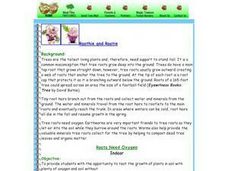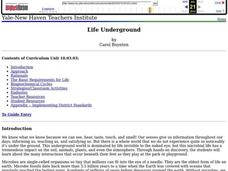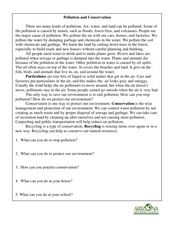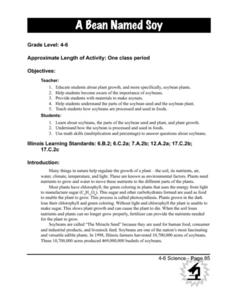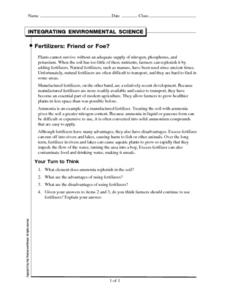Curated OER
Defining Drought
Students examine the hydrologic impacts of drought. Humans can change the course of the water cycle, to some extent, to meet their needs, but can they do so without imposing risks on the plants and animals?
Curated OER
Forest In A Jar
Students conduct an experiment using soil, water, seeds, a plant, and a jar; and then draw a poster to represent their observations and findings. They make a poster showing what happened to their aquatic environment.
Curated OER
F.B.I.
Students create a worm bin full of fruit and vegetable scraps wit paper and observe what happens over time. In this decomposers lesson plan, students observe that the fruit and vegetable scraps become new soil.
Curated OER
Roots Need Oxygen
Young scholars investigate the growth of plants in soil with oxygen and soil without oxygen. They discuss what roots need to survive, and chart the growth of two plants to analyze the difference between plain soil and soil with two...
Curated OER
WALK, DON'T RUN
1. Bring two quarts of moist soil, a cake pan, a sprinkling can of water and a quart of grass clippings to class.
2. Share background material, and introduce the word "erosion."
3. Prepare a small model hill by mounding the soil in the...
Curated OER
Life Underground
First graders build a terrarium in order to observe animal and plant life dynamics. In this biology lesson, 1st graders compare how organisms survive in different environments. They write their observations and analysis in their journal.
Curated OER
Microorganisms: Good Guys or Bad Guys?
Young scholars discover the role microorganisms play in our lives. In this decomposition lesson, students examine decaying foods and plants in order to analyze the different bacteria that grows. Young scholars discuss the good and bad of...
Curated OER
Wiggley Worms
Students investigate how worms affect plant growth. In this biology lesson, students construct a worm ecosystem in a plastic 2 liter bottle and plant a seed in the soil. They later compare the ecosystems with worms to ones...
Curated OER
Leaves and Photosynthesis
In this science worksheet, learners read detailed information about green plants and the photosynthesis process. In this fill in the blank and true and false worksheet, students answer twelve questions.
Curated OER
DON'T TREAD ON ME
Students explore how the habits and practices of people affect the soil and growth of plants. They are introduced to the phrase "soil compaction." Students play the Soil Particle Game in the related activities section. They go outside...
Curated OER
Circles in the Landscape: Irrigating Oklahoma Crops
How do you grow crops in a area with insufficient rainfall? Why you irrigate, of course. Class members investigate irrigation systems by designing a system of their own. After examining irrigation related concepts, vocabulary terms, and...
Curated OER
Defining Drought
Pupils examine the hydrologic impacts of drought. They look at drought from a variety of prespectives. Students first focus on the scientific definition of drought, including weather patterns, water cycles, water requirements by plants...
Curated OER
Plant Systems
In this plant systems learning exercise, students write true or false for the 10 sentences about plant systems. Students then label the parts of the plant.
Curated OER
Plant Reproduction
In this plant reproduction worksheet, students follow the steps to complete a science investigation and then respond to 2 short answer questions and complete a data table regarding the investigation.
Curated OER
Weeds on the Windowsill
Learners study farming and reasons to control weeds. They examine pesticides necessary for the control of weeds and the damage to the environment. Through experimentation, students plant seeds in different soils and determine if seeds...
Curated OER
Our Changing Environment-- A Demonstration
Middle schoolers observe and describe changes in an environment when some of the components are changed. They recognize the process of succession by
preparing a miniaturized environment in which a variety of plants and seeds are grown.
Curated OER
The good microbes
The question posed for the class to consider; What would decay and what would not? They read the short passage on decomposition and microbes, then mark the items that would decay after a two-week period. A scientific investigation idea...
Curated OER
Sustainable Livestock
Learners investigate healthy eating habits by researching livestock. In this food sustainability lesson, students research the negative impact factory farming has on our environment due to pollution. Learners define agricultural...
Curated OER
Pollution and Conservation
In this pollution and conservation activity, students read a passage on pollution and conservation, and answer short answer, multiple choice, and vocabulary matching questions. Students complete 27 questions.
Curated OER
Soybeans: The Miracle Seed
Students discover why soybeans are called the "miracle seeds." They make their own soynuts and share other foods made from soybeans. They create a bulletin board of soybean products.
Curated OER
Fertilizers: Friend or Foe?
In this fertilizer worksheet, learners read about natural and manufactured fertilizers. They answer four critical thinking questions about fertilizers and their use.
Curated OER
Salt Marsh in a Pan
Students create a model of a salt marsh to discover the impact of pollution and human activities on water-based habitats including bays and the ocean. They recognize the relationship between natural and developed areas. Students impact...
Curated OER
Acid Rain
Students understand the dynamics of acid rain and its impact on the living and non-living environment. They hypothesize how acid rain affects water pH levels in two lake systems with differing watershed features.
Curated OER
Compost in a Bag!
Fourth graders experiment to see which objects decompose. In this compost lesson, 4th graders observe the changes of labeled objects in a bag. Leave the objects for one month and record the changes by observation and weight. Students...



